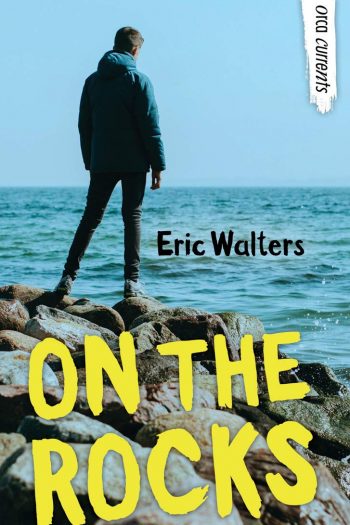On the Rocks
Genre: contemporary

Author: Eric Walters
Publisher: Orca Book Publishers
Fourteen-year-old Dylan is sent to live with his estranged grandfather, Angus. Basically strangers, the two avoid each other as best they can. One day Dylan discovers a young orca stranded high up on the rocky beach. Dylan runs to tell his grandfather. There’s nothing that can be done, says Angus. The sun is coming up, and soon the orca will die of exposure. But Dylan knows he has to try to save the whale. He collects towels to cover the delicate skin of the orca and begins transporting buckets of water from the ocean below to keep it hydrated. It’s grueling work, and it will be hours before the tide comes back in and the water is high enough for the orca to swim free. Angus is moved by his grandson’s determination and helps as best he can. They both desperately hope that soon the orca will be able to join its family, who have been calling out to it just offshore. On the Rocks is an inspiring story about the ups and downs of family.
left no-repeat;left top;; autoWhen I first read the back-cover summary, I braced myself for a corny story. Who hasn’t read this tired storyline before? Bored or troubled grandchild is forced to spend a summer with an uncool grandparent, who turns out to be okay.
Oh, and we’re told this kid discovers a beached whale and saves it.
Well, in the hands of any other writer, it probably would have felt forced or dull or full of holes. But I couldn’t put this book down. Its pace and tension is strong beginning to end, with authentic-feeling characters who change gently and naturally over the course of the story. Also, the main character is likeable because far from being a bored, troubled 14-year-old, he’s someone whose mother -- estranged from this grandfather -- is in rehab.
At first, of course, Dylan and his grandfather have no clue what to do with one another. So his grandfather paints canvases while Dylan turns into a handyman, organizing and fixing up the cabin when he’s not off exploring the island. There’s a nice dollop of humor in Dylan deciding the two are in a contest as to who can speak the fewest words to the other each day.
Then he dusts off some old kayaks and teaches himself to paddle. I love the scene where he first meets the pod of killer whales:
My brain raced, trying to make sense through the fear. No sharks. Sharks didn’t travel together. And then I remembered that a shark’s dorsal fin has a straight edge... It was a bunch, um, no a herd, no that was wrong. A school... Just then a gigantic fin rose very close to my kayak. Below it I saw a black back and a flash of white and then a head. It wasn’t a dolphin -- it was a killer whale, and it was looking right at me! It slid back under the water, and a second one breached right beside it.
Then there’s the whale who ends up beached after a storm and tide change, its pod calling to it worriedly from the ocean nearby. It’s a scene that brings boy and grandfather together as they work to save it, and leads to a new mutual respect between them.
“We’d just be wasting our time,” the grandfather says.
“Do you have someplace you’re supposed to be?”
“Of course not.”
“So why not try? And even if we can’t save him, we still wouldn’t have wasted our time. We’d know we had done everything we could. We have to try... Doesn’t everybody deserve a second chance?”
It’s a metaphor for their torn family, of course, which only Dylan seems to be taking the initiative to mend. It’s also a nail-biting scene that doesn’t once turn corny. And when the mother joins them after rehab? (Halt right here if you’re allergic to spoilers.)
My mom looked a bit confused. “Well, I guess we should get up to the cabin,” she said.
“Maybe before we do that, you could start by giving each other a hello hug.” I was determined to make these two important people in my life work things out. They both looked uneasy.
“It’s easy. Real easy,” I said. “Both of you, come here.” I reached out and threw one arm around my mother and the other around my grandfather. I pulled them both in and felt them extend their arms around me and around each other.
“Grandpa, you were wrong about us being a good team.”
“I was?” he asked.
“Yeah, we’re not a team. We’re a family.”
Like all the Orca Currents books, this is a short, easy read sure to draw in any reader, including reluctant or struggling readers. What could be more valuable than that?
- PW
left no-repeat;left top;; auto
